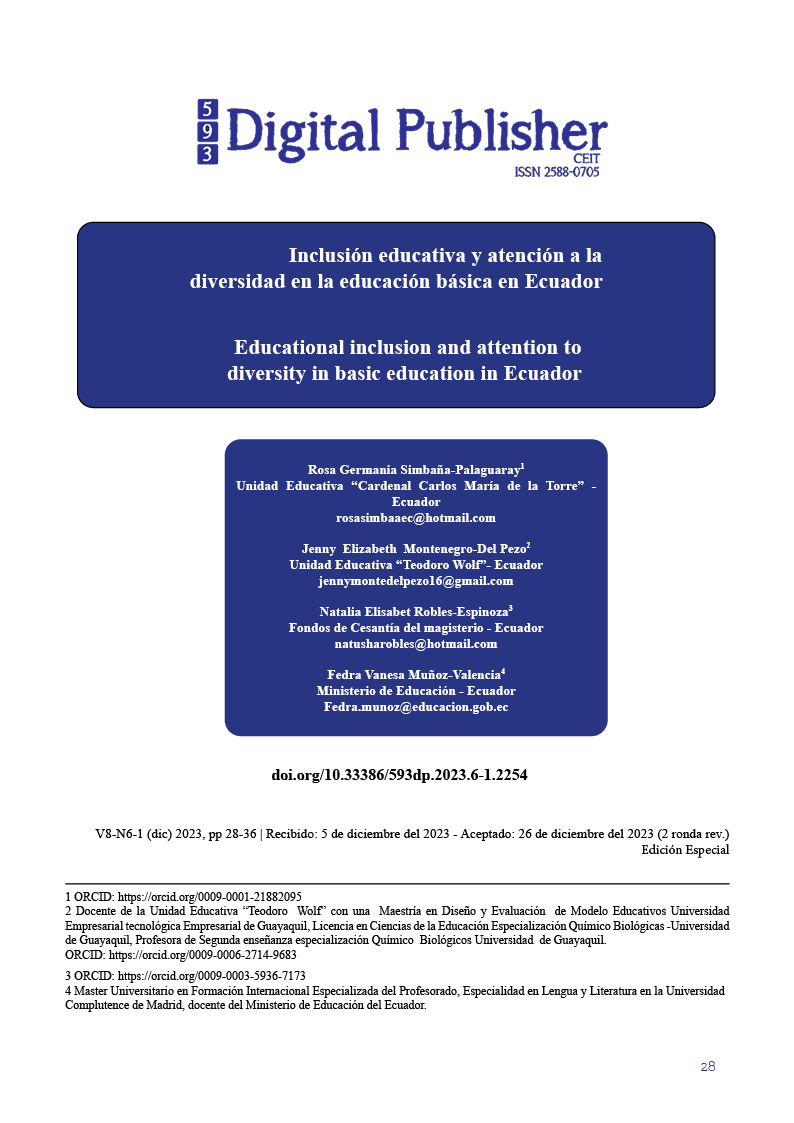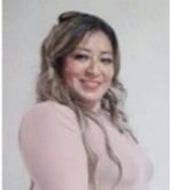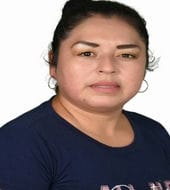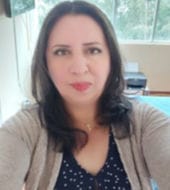Educational inclusion and attention to diversity in basic education in Ecuador
Main Article Content
Abstract
In this essayistic approach, the research focused on educational inclusion and attention to diversity in basic education in Ecuador. The main objective was to analyze the level of inclusion and understand the barriers that exist to achieve equitable and quality education for all students. The study was conducted based on bibliographic sources, allowing the identification of strengths and weaknesses in the educational system in terms of inclusion and attention to diversity. The results indicate that although progress has been made in educational inclusion, there are still significant challenges. It is necessary to have more resources, specialized teacher training, and appropriate curricular adaptations to ensure inclusive education. The conclusions highlight the importance of promoting policies and strategies that foster inclusion and address the individual needs of students. Emphasis is placed on the need to generate a cultural change in society and educational institutions to value diversity as an enriching resource. These findings from interpretive dimensionshave theoretical and practical implications. At the theoretical level, they contribute to the development of new approaches and conceptual frameworks in the field of educational inclusion. At the practical level, recommendations are provided to improve educational policies, teacher training, and pedagogical practices. Finally, this study emphasizes the importance of advancing towards a more inclusive and equitable education in basic education in Ecuador. It requires a joint commitment from educational authorities, teachers, students, and society as a whole to achieve true educational inclusion and attention to diversity.
Downloads
Article Details

This work is licensed under a Creative Commons Attribution-NonCommercial-ShareAlike 4.0 International License.
1. Derechos de autor
Las obras que se publican en 593 Digital Publisher CEIT están sujetas a los siguientes términos:
1.1. 593 Digital Publisher CEIT, conserva los derechos patrimoniales (copyright) de las obras publicadas, favorece y permite la reutilización de las mismas bajo la licencia Licencia Creative Commons 4.0 de Reconocimiento-NoComercial-CompartirIgual 4.0, por lo cual se pueden copiar, usar, difundir, transmitir y exponer públicamente, siempre que:
1.1.a. Se cite la autoría y fuente original de su publicación (revista, editorial, URL).
1.1.b. No se usen para fines comerciales u onerosos.
1.1.c. Se mencione la existencia y especificaciones de esta licencia de uso.
References
Abellán Fernández, J. (2014). La reflexión sobre las finalidades
de la enseñanza de la historia. Un estudio de caso en la formación inicial
del profesorado en el sistema educativo mexicano. Tesis Doctoral, Universitat Autónoma de Barcelona, Facultat de Ciències de L’educació, Departament de Didàctica de la Llengua, la Literatura i de les CiènciesSocials,
Barcelona-España.
Araujo, M. D. y Bramwell, D. (2015). Cambios en la política educativa en Ecuador desde el año 2000. Paper commissioned for the EFA Global Monitoring Report 2015, Education for All 2000-2015: achievements and challenges”, efareport@unesco.org.
Argote D. T. y Villota Insuasty J. C. (2010). La enseñanza en el proceso de
integración escolar de niños y niñas
con discapacidad cognitiva en el aula
de básica primaria. En:Vásquez Rodríguez, F. (Comp.), Estrategias de enseñanza: investigaciones sobre didáctica en instituciones
educativas de la ciudad de Pasto (pp. 81-101). Bogotá: Universidad de la Salle.
Carrillo Vargas, C. M., y Moscoso Jurado, D. E. (2022). La inclusión educativa y atención a la diversidad en educación. Ciencia Latina Revista Científica Multidisciplinar, 6(5), 60-75.
Delors, J. (1996). La educación encierra un tesoro. Madrid: Santillana.
ElacquaMarotta, G. L. y Méndez, C. (2020). Covid-19 y desigualdad educativa en América Latina. [Documento en línea]. Disponible: https://elpais.com/planeta-futuro/2020-10-11/covid-19-y-desigualdad-educativa-en-america-latina.html [Consulta: 2023, Septiembre 17].
Garnier, L. (2022).Volver a la escuela luego del COVID-19: ¿por qué no un regreso al futuro? [Documento en línea]. Disponible: https://blogs.iadb.org/educacion/es/volver-a-la-escuela-luego-del-covid-19-nueva-educacion-futuro/ [Consulta: 2023, Septiembre 15].
Gómez-Arteta, I. y Escobar-Mamani, F. (2021). Educación virtual en tiempos de pandemia: incremento de la desigualdad social en el Perú.[Documento en línea]. Disponible: https://preprints.scielo.org/index.php/scielo/preprint/download/1996/3262/3383 [Consulta: 2023, Septiembre 15].
González, B. (2021).Los diez retos de la educación. [Documento en línea]. Disponible: https://www.uoc.edu/portal/es/news/actualitat/2021/111-diez-retos-educacion.html [Consulta: 2023, Septiembre 17].
Ley Orgánica de Educación Intercultural. Registro Oficial de la República del Ecuador 499,Marzo 31, 2011. Quito, Ecuador.
Ministerio de Inclusión Económica y Social (MIES) (2013). Políticas públicas para el desarrollo infantil integral. [Documento en línea]. Disponible: https://www.inclusion.gob.ec/wp-content/uploads/downloads/2013/11/Libro-de-Pol%C3%ADticas-P%C3%BAblicas.pdf[Consulta: 2023, Septiembre 16].
Organización Panamericana de la Salud (2020).Las funciones esenciales de la salud pública en las Américas. [Documento en línea]. Disponible: https://iris.paho.org/bitstream/handle/10665.2/53125/9789275322659_spa.pdf [Consulta: 2023, Septiembre 18].
UNESCO/IESALC (2020).COVID-19 y educación superior: de los efectos inmediatos al día después. [Documento en línea]. Disponible: https://www.iesalc.unesco.org/wp-content/uploads/2020/05/COVID-19-ES-130520.pdf [Consulta: 2023, Septiembre 18].
UNICEF ECUADOR (2021).Priorizar la educación para todos los niños y niñas es el camino a la recuperación. [Documento en línea]. Disponible: https://www.unicef.org/ecuador/comunicados-prensa/priorizar-la-educaci%C3%B3n-para-todos-los-ni%C3%B1os-y-ni%C3%B1as-es-el-camino-la-recuperaci%C3%B3n [Consulta: 2023, Marzo 17].
Universidad Pedagógica Experimental Libertador (2016). Manual de trabajos de grado de especialización y maestría y tesis doctorales (5a. ed.). Caracas: Fondo Editorial de la Universidad Pedagógica Experimental Libertador.
Universidad Pedagógica Experimental Libertador (2022). Manual de trabajos de grado de especialización técnica, especialización y maestría y tesis doctorales. Caracas: Fondo Editorial de la Universidad Pedagógica Experimental Libertador.
Viteri, A., Morduchowicz, A. y Rieble, S. (2021).Después del COVID-19, ¿qué? La educación de América Latina y el Caribe hacia el futuro. [Documento en línea]. Disponible: https://blogs.iadb.org/educacion/es/despues-del-covid-19-que-la-educacion-de-america-latina-y-el-caribe-hacia-el-futuro/ [Consulta: 2023, Septiembre 16].





